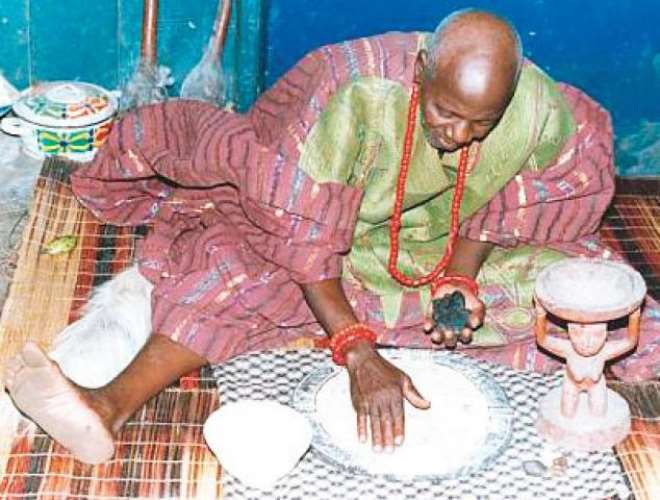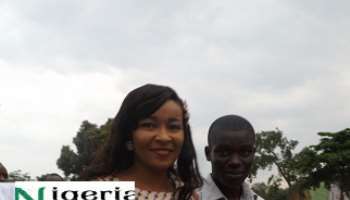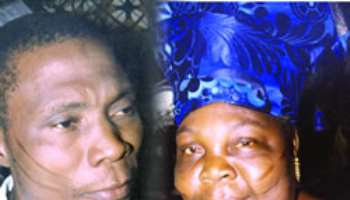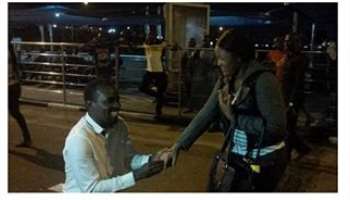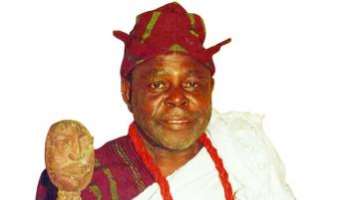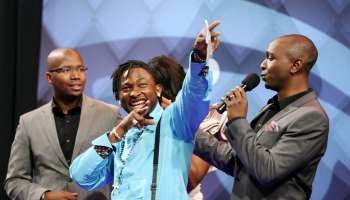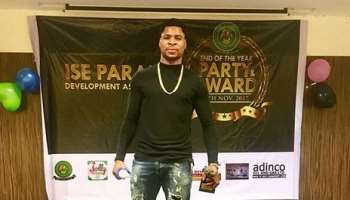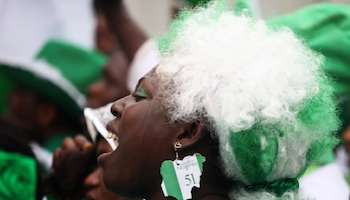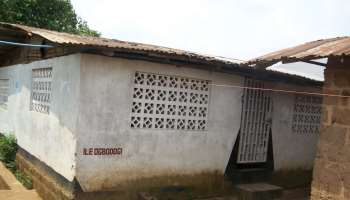I am a Babalawo –Prof. Wande Abimbola
Prof. Wande Abimbola Professor Wande Abimbola is an enigma any day. The former Vice Chancellor of Obafemi Awolowo University (OAU) is the Awise Awo Agbaye (Spokesman of Ifa and Yoruba Religion Worldwide). His Caucasian wife is known as Ajisebo ( one who is versed in offering sacrifices ). Ajisebo is an Iyanifa (Ifa priestess) and she chants the Ifa Corpus in standard Yoruba. His son with Ajisebo, a bright two-year-old, is named Iroko(as in Iroko tree). As Vice Chancellor, he often invited Babalawos to offer sacrifices to the gods “ so that there would be peace and progress on the campus and for a lot of good things too”. Does the mystery deepen?
It is said that during your tenure as Vice Chancellor, whenever the students wanted to embark on any demonstration you would address them making some gesticulations and they would be pacified. That you would then give them akara (bean cakes)….
(Prolonged laughter) It is true that whenever they were to embark on any protest and I addressed them, they would listen. They had songs for me. And they would sing and dance after. But it is not true that I was using charms to do that.
No, I was not. If you even do that and you are bad or your behaviour is bad, they would not listen to you. The students were listening to me because they knew me. They knew I was only for their good and success and a father. Hence, they listened when I talked to them. However, we were offering sacrifices. We were doing that to appease the gods so that there would be peace and progress in the campus and for a lot of good things too. I would send for babalawos who would come and join me in making the divinations.
How did you reflect that in the school budget?
I was using my own money. The babalawos all over the world have made me their spokesman. In Cuba alone there are over 100,000 babalawos. Only babalawos and not other followers or priests of other African religions. In Brazil too, it is like that. That is why I said that all those have not gone into extinction. It is only that people do not understand. And the understanding would come and many would return to the traditional ways and religions. It is even happening now. And it does not mean you cannot continue to be a Christian and attend church services. I do not attend but in Cuba and Brazil, there are a lot of the babalawos who still attend churches. They attend churches for their white slave masters and Ifa, Oya, Sango and others because of their ancestors who worshipped in such ways.
When did you become an Ifa worshipper?
Yes, I have always been. But some time ago when I was in the secondary school, an American Baptist secondary school, called Baptist Boys Secondary School, Oyo, everybody there then would go to church on Sunday. In fact there was a society then called Evangelical Students Society. If you belonged to that society you had to go and preach at a station which they would give you. That was how I went to preach at Jagun Village, Ijaye Orile and other places. I was a student pastor. But I never abandoned my Yoruba religion.
Oh! In fact when returning in the evening from the evangelical trip, I would be chanting ijala and the Ifa corpus and my fellow students would surround me. But since I left the secondary school, it has stopped since nobody forced me in the first instance. I don't go to church any more. But if anyone invites me I do go. There is a cousin of mine, we are childhood friends. If he is doing anything in church I would be the first person to get there. That is one of the traits of our belief. You do not see any practitioner of the traditional religion who would say one faith or religion is not good. Like I said earlier on, our things are equally good. And even, now those who confused us earlier on are retracing their steps.
How can traditional religion be engaged to impact positively on Nigeria and Nigerians?
I am a practitioner of the Yoruba religion. I am a babalawo. My full name is Ogunwande. My home here is the number one Ogun home in the whole of Oyo land. My elder brother is the Asipade, that is, the generalissimo of Ogun in Oyo land. Our indigenous ideas, values and religions are beautiful. And they work. I was saying earlier that I don't take bribes and so on. All those come from our indigenous religion. An Ogun person should not tell a lie if he knows that it is a lie. You cannot find an Ogun priest going to pluck the okro of his neighbour or a babalawo. And I was telling you that one should be contented with whatever one has, and not look for material wealth are values from our indigenous religion. Up till now, there are many people in the religion.
There are many Sango worshippers here in Oyo. There are also many babalawos, Oya worshippers and so on. Thousands of people still follow that religion. You are not going to find one; I repeat not one of them who has ever been arrested for stealing or for doing something wrong because that is what we believe. Ifa is beautiful. But alas, there came a time when our children did not know that our things were beautiful anymore. But another time is coming and the revolution has already started in America, South America, all over the world. Many people are returning to the traditional ways. Even there is an indigenous European religion before Christianity which many Europeans are now returning to. It is called Wiker.
It is more alive in places like Ireland and even in Italy where we have the Pope. Ifa is part of me and we do not have anything against other people who practice other religions. Religion should be your own thought. Everybody should be free to imbibe any way of life or any religion that he or she wants. Nobody should be compelled or cajoled out of his own way of life. It should be a crime to do that. But unfortunately, that is the stock in trade of Christianity and Islam. But do you think there are many Christians and Muslims who have completely left our tradition? You cannot count 10 percent of them who have done so. You cannot do it. Our traditions are so strong that they are still there. Traditions die hard. They never go away. If they are profound they will be there. Somebody may try to cover them up but when you dig they would be there.
Latest News
-
 "If You're For Me, I Am For You" - Cubana Chief P
"If You're For Me, I Am For You" - Cubana Chief P -
 "3 Days To Go" - Femi Adebayo Urges Fans To Get S
"3 Days To Go" - Femi Adebayo Urges Fans To Get S -
 "Stop Asking Me Questions About Speed Darlington"
"Stop Asking Me Questions About Speed Darlington" -
 "Benue Is The Most Underdeveloped State I've Ever
"Benue Is The Most Underdeveloped State I've Ever -
 Stan Alieke Urges Young Professionals To Take Lin
Stan Alieke Urges Young Professionals To Take Lin -
 Chizzy Alichi Teases Fans With Baby Reveal, Promot
Chizzy Alichi Teases Fans With Baby Reveal, Promot -
 "I'm Not Wearing Makeup From July 4th Till Decemb
"I'm Not Wearing Makeup From July 4th Till Decemb -
 "Stop The Challenge Of Mocking Kids With Down Syn
"Stop The Challenge Of Mocking Kids With Down Syn -
 Regina Daniels Celebrates Sons As They Mark Birthd
Regina Daniels Celebrates Sons As They Mark Birthd -
 Speed Darlington Threatens To Sue NAPTIP For Defam
Speed Darlington Threatens To Sue NAPTIP For Defam


